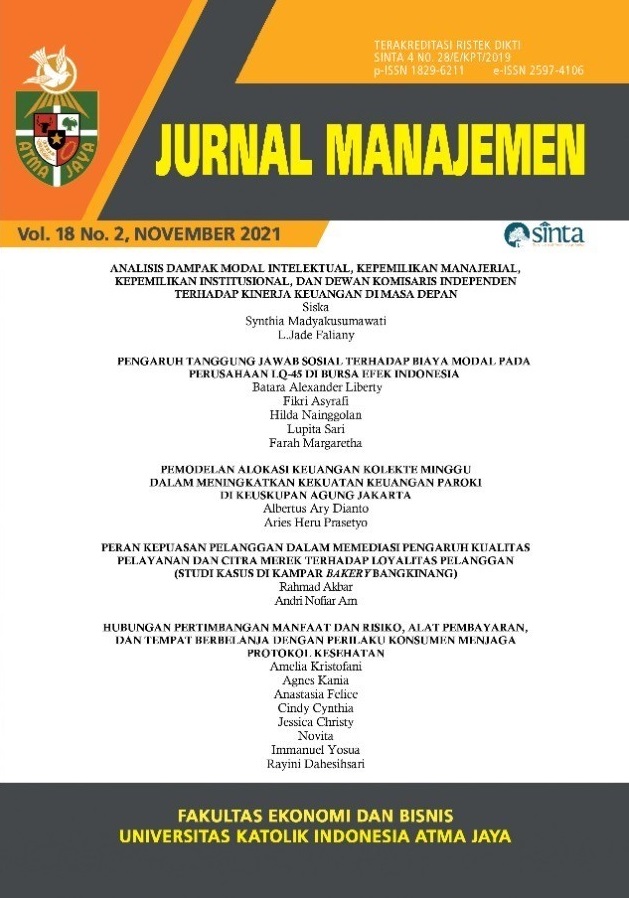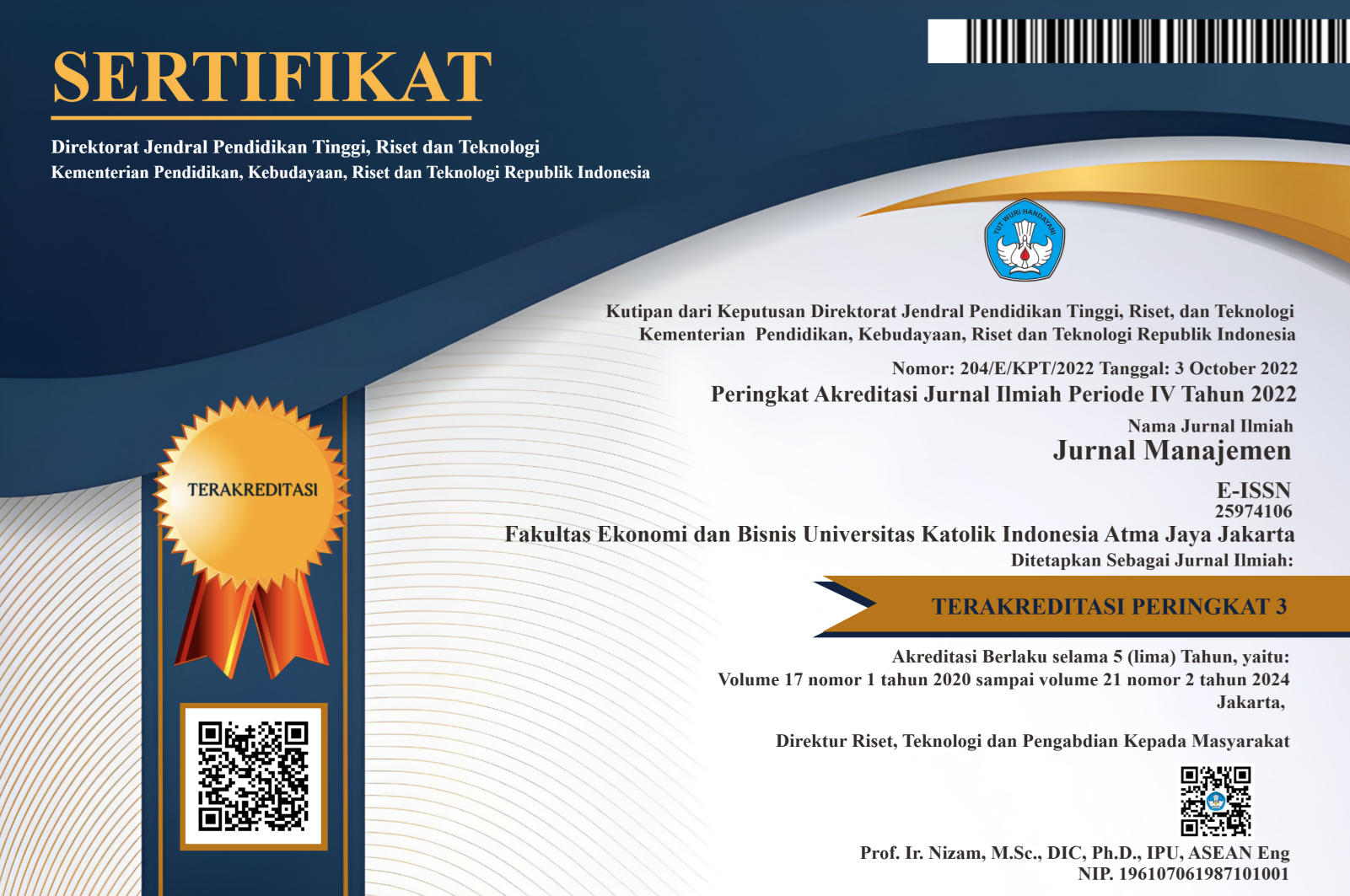PEMODELAN ALOKASI KEUANGAN KOLEKTE MINGGU DALAM MENINGKATKAN KEKUATAN KEUANGAN PAROKI DI KEUSKUPAN AGUNG JAKARTA
FINANCIAL MODELING ALLOCATION OF THE SUNDAY COLLECTION IN INCREASING THE FINANCIAL STRENGTH OF PARISHES IN THE JAKARTA ARCHDIOCESE
DOI:
https://doi.org/10.25170/jm.v2i18.2671Kata Kunci:
Diocese, Parish, Collection, Pastoral Solidarity Fund, Liquidity Ratio, Valuation, Financial ModelingAbstrak
Keuskupan Agung Jakarta sebagai institusi keagamaan Gereja Katolik mempunyai kekhasan dalam pengelolaan keuangannya dengan mengacu pada Hukum Gereja dan peraturan keuangan publik yang berlaku. Kekhasan tata kelola keuangan di Keuskupan Agung Jakarta nampak pada penerapan kebijakan alokasi dan kolekte minggu yang menjadi sumber dana pokok penerimaan paroki. Dana yang diperoleh paroki wajib disetorkan ke keuskupan sebagai bentuk ungkapan solidaritas yang diatur dalam kebijakan persentase Dana Solidaritas Pastoral, sedangkan dana yang masih ada di paroki digunakan untuk membiayai beban operasionalnya dan biaya kegiatan lainnya. Adanya kenyataan semakin bertambah jumlah paroki yang mengajukan kolekte II dari tahun ke tahun menunjukkan peningkatan kebutuhan dana operasional paroki yang harus tercukupi. Melalui penilaian valuasi atas kebijakan persentase DSP ingin diperoleh suatu usulan alternatif atas pemodelan keuangan terkait kebijakan yang diterapkan sehingga paroki memiliki kekuatan keuangan yang baik. Dengan mengadakan analisa keuangan berdasarkan laporan posisi keuangan, laporan aktivitas dan laporan arus kas ingin diketahui rasio likuiditas yang menunjukan kemampuan kinerja keuangan paroki sehingga dapat digunakan sebagai alat pertimbangan mengadakan penilaian valuasi.
Referensi
Damodaran, A. (2002). Investment Valuation. Tools and Techniques for determining The Value of any Asset, New York: John Willey & Sons, Inc.
Gharbi, L. (2016). A critical analysis of the use of fair value by Islamic financial institutions. Journal of Islamic Accounting and Business Research, 7 (2), 170-183.
Hardani, Andriani, H., Ustiawaty, J., Utami, E.F., Istiqomah, R.R., Fardani, R.A., Sukmana, D.J., Auliya, N.H. (2020). Metode Penelitian Kualitatif dan Kuantitatif. Yogyakarta: Pustaka Ilmu.
Hardawiryana, R. (2016). KITAB HUKUM KANONIK (Codex Iuris Canonici), Edisi Resmi Bahasa Indonesia, KWI, Jakarta.
Hillary, G., Hui, K.W. (2009). Does religion matter in corporate decision making in America? Journal of Financial Economics, 93(3), 455-473.
Kasmir. (2015). Analisis Laporan Keuangan. Jakarta: Rajawali Pers.
Penman, S. (2001). Keuangan statement analysis and security valuation, McGraw-Hill, Singapore, Jurnal Akuntansi dan Investasi Vol. 3 No. 2, (Juli 2002).
Prasetyo, A.H. (2014), Pemodelan Keuangan. Jakarta: PPM Manajemen.
Shafii, Z., Rahman, A.R.A. (2016). The application of IFRS9 and fair value measurement for Islamic financial instrument. Journal of Islamic Accounting and Business Review, 7 (3), 202-214.
Tim Keuangan Keuskupan Agung Jakarta. (2019). Pedoman Keuangan Paroki, Jakarta.
Tim Temu Kanonis Regio Jawa. (1993). DOKUMEN KONSILI VATIKAN II. Jakarta: OBOR.
Wild, J.J., Shaw, K.W., Venkatesh, S., Kwok, W., Chiappetta, B. (2016). Fundamental Accounting Principles – Second Edition Asia Glonal Edition. Singapore: McGraw-Hill Education.
Unduhan
Diterbitkan
Terbitan
Bagian
Lisensi
Authors who publish with this journal agree to the following terms:
Authors retain copyright and grant the journal right of first publication with the work simultaneously licensed under a Creative Commons Attribution-NonCommercial-ShareAlike License that allows others to share the work with an acknowledgement of the work's authorship and initial publication in this journal.
Authors are able to enter into separate, additional contractual arrangements for the non-exclusive distribution of the journal's published version of the work (e.g., post it to an institutional repository or publish it in a book), with an acknowledgement of its initial publication in this journal.
Authors are permitted and encouraged to post their work online (e.g., in institutional repositories or on their website) prior to and during the submission process, as it can lead to productive exchanges, as well as earlier and greater citation of published work (See the Effect of Open Access).













